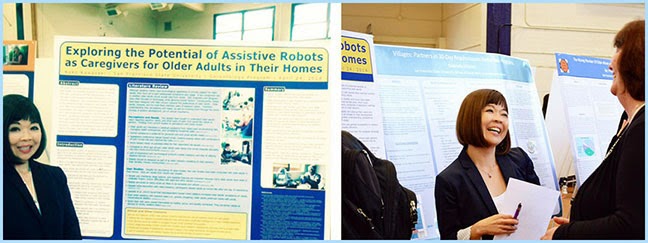I think it is important that the myth that men don't feel sad is busted. It is so damaging for everyone and society as a whole. - Robin Hadley, PhD
Articles and research on the effects of involuntary childlessness often focus on women. Interestingly, we seldom read or hear about childless older men's experiences and whether they feel sadness in not having children. As a Master's student, Dr. Robin Hadley sought to investigate the experiences of childless men as there was little information available. The research culminated in Dr. Hadley's PhD dissertation, Life Without Fatherhood: A Qualitative Study of Older Involuntarily Childless Men. Recently, I had the opportunity to ask Dr. Hadley some questions in his area of expertise to which he provided insightful responses:
 |
| Dr. Robin Hadley (© Paul Tonge) |
I was looking for a subject for my Masters dissertation in Counseling and in discussion with my supervisor, Liz, I just said, "I was really broody in my 30's". She replied she'd not heard anything about that subject and so that is how it started. I then found there was very little about the male experience of childlessness and that has spurred me on. I think it is important that the myth that men don't feel sad is busted. It is so damaging for everyone and society as a whole.
Yes I believe there is a stigma about older men without children. In fact it is a double taboo as both older people generally are subject to ageism and the childless are seen as 'different' and suspect. The men in my recent study all reported a fear of being seen a paedophile and the view of men as a threat is reported widely in the media.
Are older men without children at a greater disadvantage as they grow older? If so, in what ways?
It rather depends on their circumstances. However, men tend to have smaller social networks than women and when men exit work, their social network also tends to reduce. If they have a partner, they may come to rely on their partners’ social network. If the men's partner dies, their social network can again reduce. European research shows that there is no difference between the older childless and similar people with children. The difference occurs if something negative happens to the childless person. For example, if they fall ill, formal care is accessed earlier and they are more likely to be taken in to a care facility earlier and for longer compared to people with adult children. Adult children are often advocates in their parents’ dealings with health and care service providers. In the UK, there have been a number of high profile cases of poor care/abuse of older people in health and care facilities. The majority of these cases were highlighted by adult children.
It rather depends on their circumstances. However, men tend to have smaller social networks than women and when men exit work, their social network also tends to reduce. If they have a partner, they may come to rely on their partners’ social network. If the men's partner dies, their social network can again reduce. European research shows that there is no difference between the older childless and similar people with children. The difference occurs if something negative happens to the childless person. For example, if they fall ill, formal care is accessed earlier and they are more likely to be taken in to a care facility earlier and for longer compared to people with adult children. Adult children are often advocates in their parents’ dealings with health and care service providers. In the UK, there have been a number of high profile cases of poor care/abuse of older people in health and care facilities. The majority of these cases were highlighted by adult children.
Was there anything that you found in your research that surprised you?
There are three things that surprised me: firstly, that the men very easily talked about their thoughts and feelings to a complete stranger. Many of them said this was the first time they had spoken about their feelings and thoughts about childlessness. Secondly, the fear that they all expressed about being viewed a paedophile - it is such a shame that all men are portrayed as a threat whatever their age. Thirdly, four of the men I spoke to had a role of 'grandfather'. The benefit they showed in those relationships was a joy to see.
What advice would you give to men who wished to be fathers but are childless and having regrets?
Do something! Either talk with someone you trust or with a
counselor. All the men I have spoken to considered becoming a father as
natural. Not achieving it was a loss that was not possible to talk about - as
men aren't 'supposed' to care! Therefore, the impact of non-fatherhood is not
recognised in society and that loss does need to be acknowledged. Keeping it in
and not being able to appreciate your feelings may adversely affect thoughts,
feelings and behaviour. I would also consider looking at what connections
you have that may give you the chance to have a role as an active uncle,
grandfather, mentor or advisor. For example, in the UK many schools encourage
older people to become involved in reading to children who would benefit from
person-to-person learning.
 |
| Left: Graduating from Keele University, 2015. Right: Final Thesis |



















